Exercise as Medicine: The CHALLENGE Trial’s Breakthrough for Colon Cancer Survivors
Sep 15, 2025
For years, we’ve known that exercise improves fatigue, strength, and quality of life during and after cancer treatment. What we didn’t know, at least not at the highest scientific level, was whether movement could directly lower the risk of cancer coming back, or even help survivors live longer.
That changed in 2025 with the landmark CHALLENGE Trial, a multi-national, Phase III randomized controlled study that put exercise to the test for colon cancer survivors.
The trial followed 889 survivors of stage III or high-risk stage II colon cancer across six countries. All participants had already undergone surgery and adjuvant chemotherapy. They were randomized into two groups:
-
A structured exercise program guided by physical activity consultants, including supervised sessions, aerobic training, and ongoing coaching over three years.
-
A control group that received health education materials on diet and lifestyle, but no structured exercise program.
After nearly eight years of follow-up, the results were clear:
-
Survivors in the exercise group had a 28% lower risk of cancer recurrence or new cancer compared to controls.
-
They also had a 37% lower risk of death from any cause.
-
Improvements in fitness, such as aerobic capacity and walking performance, were sustained well beyond the intervention period.
This is the strongest evidence yet that exercise isn’t just supportive care, it’s a life-extending intervention. The benefits in recurrence and survival risk reduction were comparable to many adjuvant therapies, but with none of the toxic side effects.
For survivors, this means movement should be seen as part of the prescription for recovery, not just an optional add-on. For health and fitness professionals, it underscores the importance of delivering evidence-based, individualized oncology exercise programs - not one-size-fits-all workouts.
 Although the CHALLENGE Trial focused on exercise, it builds on a broader body of research that points toward the synergy of diet and movement. Colon cancer survivors who follow anti-inflammatory, fiber-rich diets, emphasizing whole plants, legumes, and lean protein, appear to do even better when they combine it with regular physical activity. Adequate protein is especially important to preserve lean muscle during survivorship.
Although the CHALLENGE Trial focused on exercise, it builds on a broader body of research that points toward the synergy of diet and movement. Colon cancer survivors who follow anti-inflammatory, fiber-rich diets, emphasizing whole plants, legumes, and lean protein, appear to do even better when they combine it with regular physical activity. Adequate protein is especially important to preserve lean muscle during survivorship.
LEARN MORE ABOUT INDIVIDUALIZED NUTRITION PROGRAMS
The CHALLENGE Trial has transformed the role of exercise in oncology from a supportive “extra” into a critical component of survivorship care. No longer just about easing fatigue or improving quality of life, the evidence now shows that structured, consistent physical activity can reduce the risk of recurrence, improve long-term survival, and help survivors rebuild strength, function, and resilience after treatment.
For oncology exercise specialists, nutrition professionals, and survivorship teams, these findings represent more than encouraging data, they’re a clear mandate to act. Exercise must be viewed not as an optional wellness strategy, but as a prescribed element of cancer care, on par with pharmacologic interventions and follow-up protocols. Integrating movement into survivorship plans has the power to shift outcomes, restore confidence, and give survivors tangible tools to take back control of their health.
The science is undeniable: exercise is no longer a “bonus” for cancer survivors, it’s a lifesaving intervention. But with this shift comes responsibility. Survivors deserve guidance from professionals who understand the unique risks, contraindications, and complexities of cancer treatment and recovery. A generic fitness certification simply isn’t enough.
That’s why becoming an OncoVie® Cancer Exercise Specialist (CES) matters. As the global gold standard in oncology exercise education, this credential equips you with the evidence-based knowledge, programming strategies, and medical insight to safely and effectively prescribe exercise as medicine. You’ll gain the confidence to support survivors through treatment side effects, manage risks like lymphedema or osteoporosis, and design programs that don’t just rebuild strength, they improve survival.
With nearly 20,000 specialists trained in over 55 countries, the OncoVie CES community is leading the charge in redefining survivorship care. The need has never been greater. The opportunity has never been clearer.
Your expertise can close the critical gap in oncology care. Earn your OncoVie® Cancer Exercise Specialist credential and lead the way in redefining what recovery looks like.
References
Start your journey to becoming an OncoVie™ Cancer Exercise Specialist with our world-leading courses in oncology exercise.


